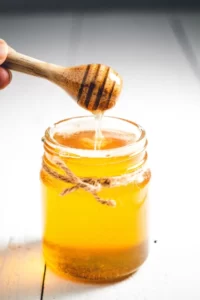Table of Contents
Let’s face it: Added sugar really isn’t great for your health. (Sorry.)
The Problem with Sugary Foods
Sugar and sweetened foods do more than leave you at risk for a cavity. They can stimulate your appetite, making you even hungrier than you were. And going overboard with the sweet stuff can put you at risk for having obesity, Type 2 diabetes, heart disease, fatty liver disease, and more.
Keeping your sugar intake low is an important part of keeping your body healthy.
How much sugar is too much?
The American Heart Association recommends the following sugar limits each day:
- 25 grams (6 teaspoons) for women and people assigned female at birth (AFAB).
- 36 grams per day (9 teaspoons) for men and people assigned male at birth (AMAB).
“The average American eats about 68 grams of sugar per day,” Taylor says. “That can add up to as much as 28 pounds of body fat per year.”
We’re all human. And cutting out sweets tomorrow probably doesn’t top your to-do list. But lowering your intake can make a big difference. Taylor explains how to go about lowering your sugar consumption in a healthy way.
Best Choice: Fresh and Frozen Fruit
Coming in at the No. 1 way to sweeten your food and drinks is by using fresh or frozen fruit.
Unlike packaged and baked sweets, which are full of empty calories, fruits are packed with nutritional benefits like fiber, vitamin C, and potassium, along with natural sugar. That makes it an ideal sweetener, Taylor says.
Fruits are perfect for getting your fill of vitamins, antioxidants, and other good-for-you compounds. So, they’ll add some sweet taste while also benefiting your whole-body health. Win-win.
Try sweetening oatmeal by mixing in a banana or applesauce. Add blueberries to plain Greek yogurt. Sweeten smoothies with frozen fruit. Or infuse your water with a handful of sliced strawberries or a few slices of limes.
Limit: Natural Sugars
Natural sugars include things like raw honey, maple syrup, agave nectar, and raw sugar.
The good news is that some natural sweeteners provide a few more nutrients than table sugar.
The bad news? They’re all still forms of sugar and are high in calories.
Any natural sugar should be counted toward your daily sugar intake — just like refined sugar.
“Whether it’s natural or refined, sugar is still sugar and should be limited,” Taylor notes.
On the plus side, raw honey and pure maple syrup both contain antioxidants and have prebiotic oligosaccharides that help feed gut flora. (Translation: They can keep your digestion on track.)
But remember, honey shouldn’t be given to infants under the age of 1. It may contain botulism bacteria spores, a serious health hazard for babies.
As for maple syrup, you want to be choosy. Some commercial maple syrup brands may contain significant amounts of high-fructose corn syrup — not natural sweeteners. Check your food labels for hidden ingredients.
“High-fructose diets are linked to long-term metabolic complications like insulin resistance, belly fat accumulation, and high triglyceride levels,” Taylor explains. “So, you’re best off avoiding food with high-fructose corn syrup.”
Agave nectar is another natural option. But it provides fewer nutrients than raw honey or pure maple syrup.
“Agave nectar has the same number of carbohydrates and calories as table sugar, but you get a lot of flavor from a small amount. So, you use less of it to get the same sweetness,” Taylor says. “It’ll still raise your blood sugar. So, if you are living with diabetes, you’ll want to be careful with it.”
The thing to remember about natural sources of added sugar: In terms of your weight and blood sugar, they behave just like sugar. So, you don’t want to overdo it.
“All added sugars are inflammatory. That includes honey and maple syrup,” Taylor clarifies.
Limit: Refined Sugar
Table sugar is inflammatory, high in calories, and offers no nutritional benefit.
It’s probably also hiding in some of your favorite foods.
“Most flavored granola bars, yogurts, and cereals already contain around a tablespoon of added sugar per serving,” Taylor says. “Many sugary drinks contain more than three tablespoons of added sugar per serving.”
Limit: Artificial Sugars
Common artificial sweeteners include things like saccharin (Sweet N’ Low®), aspartame (Equal®), and sucralose (Splenda®).
Artificial sweeteners can sound like a dream come true. All that sweet taste but no actual sugar and no (or very few) calories? Yes, please!
But artificial sweeteners come with concerns of their own.
Like what? Well…
- Saccharin (Sweet N’ Low®): Some studies have linked saccharin to an increased risk of bladder cancer in rats, but more research is needed to determine if the same applies to humans.
- Aspartame (Equal®): It has been associated with headaches, dizziness, and gastrointestinal disturbances in some individuals.
- Sucralose (Splenda®): While considered safe, it may still have a potential impact on gut health and the balance of gut microbiota.
Ready to Cut Out the Sweets?
One thing is clear: No sugar or sugar substitute is healthy in excess.
Sugar is addicting. The more sugar you eat, the more you want. But cutting back — and cutting out — added sugar is possible.
How can you break your habit?
“Challenge yourself — your foods and beverages don’t always need to taste sweet,” Taylor encourages.
Start small. You don’t have to go cold turkey to get the benefits of a less-sugared-up diet.
- Decrease the sweetener in your coffee or tea by one teaspoon per week.
- Drink more water and fewer sodas, lemonades, and sweet teas.
- Dilute juices by mixing half your usual portion with water to retain some of the sweetness.
- Start a habit of reading labels. Much of the sugar in the American diet is found in processed and sweetened pre-made food and beverages. When you start looking, you’ll realize all the places added sugar is lurking and then can look for natural alternatives.
“The goal for most people shouldn’t be to get added sugar intake down to zero. That isn’t realistic,” Taylor states. But recognizing your sugar intake is a start. And knowing where you can turn for a healthier alternative to satisfy the occasional need for sweets can help keep your body healthy. And keep your sweet tooth from taking over.



